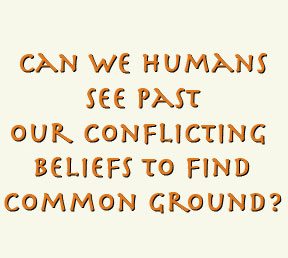
THE KIND OF STORIES WE ARE LOOKING FOR
THE CANTOR AND THE KLANSMAN In June of 1991, the Cantor Michael Weisser and his wife Julie had just moved into their new home in Lincoln, Nebraska when they received a package of hate material including a card that said: "The KKK is watching you. "They also received hateful phone calls saying things like "You’re going to be sorry you moved in, Jewboy!" The threatening voice on the other end was from 42-year-old Larry Trapp. As Grand Dragon of the Lincoln Ku Klux Klan, Trapp had expressed his hatred on local TV and radio, making his voice recognizable to Michael Weisser. Weisser decided to call back, and left the following message for this hate-filled man who had lost both of his legs to diabetes: "…with your physical disabilities, the Nazis would have made you the first to go." Then he left another message: "You’re going to have to answer to God for all this hatred one day, Larry." He went on to leave 10 such messages. Remarkably, the calls touched Trapp. "When Michael started calling my racist hotline, I could sense something in his voice that I hadn’t heard before…something I hadn’t experienced. It was love," he later described tearfully. Julie told Michael, "If this guy ever does call back, say something nice to him." Eventually Trapp did call, and Michael replied as Julie had advised. He said he knew Larry had a hard time getting around and offered him a ride to go buy some groceries. The line went quiet for a moment, until Larry replied, "I’ve got that taken care of, but thanks for asking." A month later, after a conviction for leaving threatening messages on another man’s answering machine, for which he received a sentence of two days in jail and a $500 fine, Trapp once again called the Weissers. This time he said, "I’m not feeling right about the KKK anymore. I’ve got to talk to you." The Weissers jumped on the opportunity to visit Trapp at his apartment and brought over dinner. Before she ran out the door, Julie went to her jewelry box and found a silver ring she had given to Michael years before; she decided to give it to Trapp as a goodwill gesture. Before leaving, Michael called a friend and told him, "If we are not back in a while, call the police." This was a wise precaution because unknown to the Weissers, Trapp kept an arsenal of loaded weapons in his small, dingy apartment. The police never needed to intervene. Upon their arrival, Trapp took hold of Michael’s hand, burst into tears, took off his two swastika rings, and gave them to the Weissers. "These rings are symbols of hatred and evil and I don’t want them in my life anymore," he said. Now crying themselves, the Weissers gave Larry the ring Julie had thought to bring. Four hours later, the Weissers left with all of Larry’s Nazi, KKK, and white supremacy propaganda — including a KKK hood, white beret, and Nazi flag. He told the Weissers he no longer wanted them and promised to renounce his past. Over the coming months Larry went through such a complete transformation that the Ku Klux Klan turned to threatening him. He made apologies, he joined the NAACP, spoke in public schools, and was even interviewed in Time magazine. In time, Larry was asked to speak at an interfaith Dr. Martin Luther King Jr. celebration. His words, humbly spoken, revealed a new person. "I wasted the first 40 years of my life and caused harm to other people until I believe God stepped in to give me Cantor Weisser as a messenger, to show me that I could receive love and that I could give love. I have learned we are all the same, no matter whether we’re white people, or Oriental, or black people… we’re one race." As Trapp’s illness progressed, he moved into the Weisser home and became known to the Weissers’ three teenage children as "Uncle Larry." As his heart and kidneys began to fail, Julie quit her medical assistant job to take care of him. Perhaps the most remarkable part of his transformation was his conversion to Judaism in the synagogue he had once threatened to bomb. Three months later he passed away in the Weissers’ home, surrounded by his adopted family. Version from: Gil Mann • Beingjewish.org
|
|
Comments and questions about this site can be directed to director@BeyondBeliefFilm.org |
Site Contents Copyright 1999-2009 Horse Mountain Institute & Jim Lemkin :: 7 Cole Road, Haydenville, MA 01039 :: 413.268.3500 Site Design by Positronic Design |
